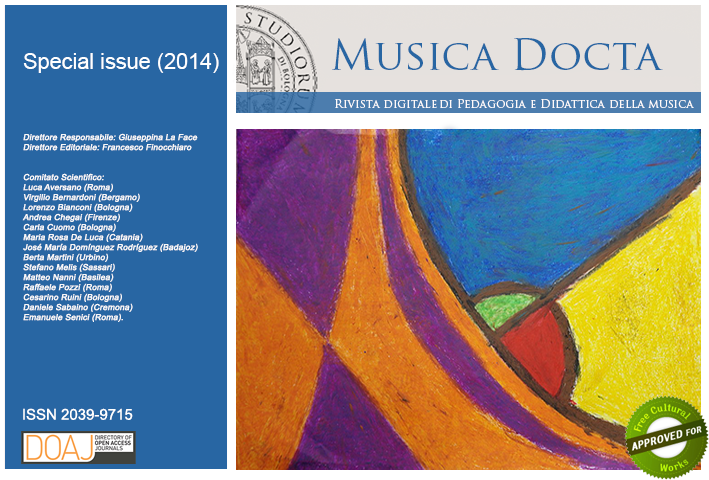Transmission of musical knowledge and history of European culture in the early decades of the 15th century
DOI:
https://doi.org/10.6092/issn.2039-9715/4305Abstract
The evolution of music history in the first half of the 14th century is characterized by an internationalization of European musical culture, as a continuation of the cultural process of early Humanism. The category of ‘evolution’, and the very idea of ‘rebirth’, or the “legend of progress” (Martin Le Franc, Johannes Tinctoris) as discussed by Reinhard Strohm, must be read today not only in terms of stylistic standardization, but also as one of the hallmarks of a search for cultural identity. Even from a historical-musical point of view, what we see is the building of a new European taste from the combination of local styles and practices, thanks to the spread of handwritten collections all over the continent. Even composers from more distant regions embraced the new style, although less regularly.
The Council of Basel was not only a historical event confined to the years during which the synod took place, just as it cannot be regarded as a mere empirical fact that only affected one city in northern Switzerland. It should rather be taken as a paradigmatic event in the cultural history of the 14th century. The encounters between intellectuals and artists, the interaction between musicians from different European regions, who met thanks to the frequent travels of the courts and chapels, turned the Council into a virtual platform for both the search for a new cultural identity, and the birth of new musical repertories and practices. The Council therefore transcends the material boundaries of the city of Basel, turning into a true ‘cultural generator’, where each individual contributed to the constant transmission and fusion of musical experiences, which became vectors for a new musical vision that reached to even the farthest corners of Europe.
Downloads
Pubblicato
Come citare
Fascicolo
Sezione
Licenza
Copyright (c) 2014 Matteo Nanni
I diritti d'autore di tutti i testi nella rivista appartengono ai rispettivi autori senza restrizioni.
La rivista è rilasciata sotto una licenza Creative Commons Attribuzione Condividi allo stesso modo 4.0 Internazionale (codice legale completo).
Vedere inoltre la nostra Open Access Policy.
Metadati
Tutti i metadati dei materiali pubblicati sono rilasciati in pubblico dominio e possono essere utilizzati da ognuno per qualsiasi scopo. Questi includono i riferimenti bibliografici.
I metadati – riferimenti bibliografici inclusi – possono essere riutilizzati in qualsiasi formato senza ulteriori autorizzazioni, incluso per scopo di lucro. Chiediamo cortesemente agli utenti di includere un collegamento ai metadati originali.






